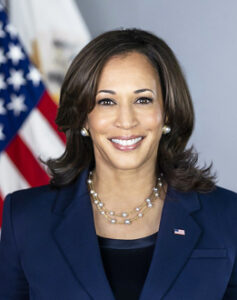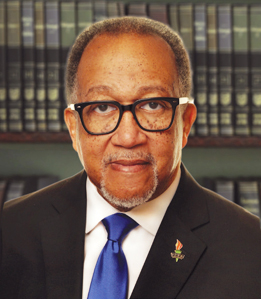
By Asia Nail
The Truth Reporter
The National Newspaper Publishers Association, NNPA, is a trade association of the more than 200 African American-owned community newspapers from around the United States. As a member of the Black press, we are an incubator for history making news that impacts our country. Vice President Kamala Harris briefed us to give breadth to the Black perspective on the Biden-Harris administration.
Benjamin Chavis, DMin, was the moderator of the afternoon briefing of Madam VP Harris. Chavis acted as a premier moderator, since activism courses through his bloodline.
His grandfather, John Chavis was the first black graduate from Princeton University and went on to set up an underground school for African Americans who were forbidden to learn to read and write. In his youth Benjamin Chavis became active in civil rights at the young age of 13 after attempting to integrate the all-white library in his North Carolina hometown. In school, Chavis was the editor of his high school newspaper while also writing for the local black paper, The Carolinian, in his spare time.
Benjamin Franklin Chavis’s moderation of the briefing was relaxed while his progressive questioning of Madam VP Harris intrigued the audience. Questions were submitted by members of the Black press and presented in conversational form. It was a delightful liberal element of innovative reasoning in action between Chavis and VP Harris.
“It was announced that the former mayor of Atlanta, Keisha Lance Bottoms, will be joining the White House, tell us more,” Chavis asked.
“She will be leading all we are doing around public outreach,” shared VP Harris excitedly.
“As a former mayor of Atlanta, Georgia, Keisha Lance Bottoms is truly someone who cares about family, communities and our country.”
This June 2022, Bottoms officially joined the Biden administration as director of the White House Office of Public Engagement.
After serving as the 60th mayor of Atlanta from 2018 to 2022, Bottoms did not run for a second term. Instead, President Joe Biden nominated Bottoms as vice chair of Civic Engagement and Voter Protection at the Democratic National Convention for the 2021–2025 term, a role focused on protecting voting rights and expanding voter participation.
A conversation about the role of Black women in the Biden-Harris administration between Chavis and Vice President Harris ensued in light of this historic announcement. “I am humbled and honored to be the first African American to hold my position,” shared Harris. “Bottoms is a very important part of this history-making administration.”
VP Harris has her own history of being the First.

With every job Harris has had, she made history: The first female DA in California, the first Black Attorney General in California and the first South Asian Senator in all of America.
Her representation speaks volumes. It says a lot of great things about Harris’ character and a lot of not-so-great things about a society full of budding Black talent often buried under unfair systems.
After the killing of George Floyd, Harris returned to the Senate with a new purpose, explaining unapologetically that, “Black Americans want to stop being killed.”
VP Harris gave a speech a few weeks ago in South Carolina that the President (when he was a candidate) had said that he was going to put a Black woman on the Supreme Court and she has now been confirmed. Soon we will all acknowledge her as Justice Ketanji Brown Jackson.
When we look at the appointments to the federal judicial courts and appointments to other branches of government, we must only look to our American Black history to know the significance of this.
The Biden-Harris administration has appointed more Black women to the federal court than any administration in the history of the country thus far. “These are the judges that will interpret the law and they will be able to bring personal experience to their perception of how equality is defined,” shares VP Harris.
“The Black press has notoriously followed urban development or a lack thereof on the topic of biased home appraisals,” says Chavis. Data shows when Black families get their homes appraised, those homes get appraised for less than if they were owned by a white family. In fact, there are examples of knowledgeable Black families staging their homes by inviting over their white neighbors in preparation for a home appraisal. After equipping the home visually with family photos of Caucasian descent the Black homeowners were given a higher appraisal.
“Under Marcia Fudge’s leadership in the Biden-Harris administration we have now confronted the issue of biased appraisals,” explained Harris proudly.
The Biden-Harris administration is also doing historically ground-breaking work by way of criminal justice reform. In May 2022 of this year, the Biden administration signed an executive order on police reform.
President Biden’s historic Executive Order to advance effective, accountable policing and strengthen public safety, promotes accountability and creates a new national database for police misconduct. The EO orders the Attorney General to establish a National Law Enforcement Accountability Database, in which all Federal law enforcement agencies (Federal LEAs) must participate. The database will include records of officer misconduct (including convictions, terminations, de-certifications, civil judgments, resignations and retirements while under investigation for serious misconduct, and sustained complaints or records of disciplinary actions for serious misconduct). The order celebrates accomplishments as well with commendations and awards.
“Numbers show that what our administration did by extending the child tax credit substantially lifted the burdens of children living in poverty the first year we implemented it,” shared Harris.
The Biden-Harris administration has also put $5.8 billion into HBCUs (Historically Black Colleges & Universities). “President Biden and I are paying attention to the disparities.”
Black publication readers have noticed a glaring difference between the focus of the mainstream media vs the focus of the Black media.
“Why doesn’t the Biden-Harris Administration get more credit for the progress you’ve made in the mainstream news,” asks Chavis.
Vice President Harris brought to mind the realization that everyone in the world has in one way or another been in home confinement due to COVID. “We are getting on the road now to make sure the American people know the accomplishments we’ve made. We all have so much to be proud of,” said Harris.
Truth be told, VP Harris is no stranger to big accomplishments.
She has been responsible for bringing Issues such as maternal mortality to the stage of the White House with other Democratic freedom-fighters such as Alma Adams and Lauren Underwood.
When Harris was in the Senate, she brought to light the issue of Black women being three times more likely to die in connection to child birth than any other group. “The Black press has been fair. We don’t expect special treatment, just fair treatment to cover our administration’s accomplishments, because they are significant,” shared Harris.
Michael Regan (one of the Nation’s Black leaders on environmental issues) and Harris have gone on a ‘road-show’ of sorts to speak to Americans about the national emergency of lead pipes.
Michael S. Regan is the administrator of the Environmental Protection Agency (EPA).
The impact this Infrastructure Law will have on the quality of life for not only Black communities but all communities, particularly those who have been disproportionately exposed to environmental hazards like lead pipes, is tremendous.
“Over half of America’s children under the age of six are at risk of lead poisoning via pipes or paint,” explained Harris. Administrator Regan and Secretary of Housing and Urban Development Marcia Fudge have been getting out and speaking with voters about the Bipartisan Infrastructure Law.
The Bipartisan Infrastructure Law makes a once-in-a-generation investment of $350 billion in highway programs. This includes the largest dedicated bridge investment since the construction of the Interstate Highway System.
Whitehouse.gov says, “This Bipartisan Infrastructure Law will rebuild America’s roads, bridges and rails, expand access to clean drinking water, ensure every American has access to high-speed internet, tackle the climate crisis, advance environmental justice, and invest in communities that have too often been left behind.”
VIce President Harris concluded, “We are on the road to getting rid of all lead within our country’s pipeline through our administration’s Bipartisan Infrastructure Law.”
This work not only affects the work mayors do all around the United States, but particularly in places like Flint, MI where residents have had a horrific water crisis. Lead in pipes is not exclusive to the Black community, in contrast it causes a detrimental effect on all of our children’s health and ability to learn in America.
“What our administration says is that the government should think of this as a public health matter that requires us to invest public dollars in removing dangerous lead pipes,” said Harris.
Black media publishers in Texas, Florida, Georgia, Alabama, Mississippi, many states are facing state legislatures that are doing anything they can to keep people from voting.
“How do we overcome voter suppression?”
What we know historically is every election cycle black Americans say why should I vote? The VP suggested that underserved America can overcome voter suppression by understanding that when they turned out in record numbers in 2020, the impact can be seen today.
If we look at the states with restrictions on voting there seems to be an overlap of restrictive citizens’ rights, including a woman’s right to make decisions about her own body and reproductive health.
Thanks to President Joe Biden signing into law a federal holiday to commemorate and celebrate Juneteenth. Many people wanted to know how they should celebrate.
A cool way VP Harris framed her answer was describing Cali culture. For anyone who knows Oakland and Berkeley, California, there was a place called Rainbow Sign. Known locally as, “A Black Table at Which Everyone Is Welcome to Eat,” Rainbow Sign was an intergenerational community center. Often described as somewhere between a Black progressive headquarters and a middle class social club, it attracted all walks of life.
Harris recalled, “My mother would take me and my sister to Rainbow Sign. Nina Simone, Maya Angelou, Ishmael Reed, politicians and artists would be there talking about everything from art to music to poetry to politics.”
When it came to Harris’ parents they had a fascinating love story. They met while pursuing their graduate degrees at UC Berkeley falling in love with their shared passion for the civil rights movement. VP Harris then shared memories of the aroma in the air of big pots of soul food cooking in the kitchen at Rainbow Sign, and how both the kids and adults would listen to various leaders talk about the issues of the day.
Regardless of our political preferences we can all agree the recognition of Juneteenth as a National holiday was long past due and is much appreciated by the American people who value historical advancements among black people.
“The Juneteenth principles I think Americans should celebrate are freedom and liberty,” shared VP Harris passionately. Before the Civil War, the few times the media talked about freedom came primarily from the black press by way of journalism on freedom of expression.
“We’ve clarified what slavery is to America, now it’s time to clarify what freedom is.”
Black leadership has become increasingly fragmented and uncertain yet the Biden administration is still managing to ‘Build Back Better’ for the underserved. Many civil rights activists are even hanging up their marching shoes and running for public office.
Black politicians, in fact, are the new black leadership class.
As Democrats do their best to ‘Deliver’, make sure your vote is a part of the collective conversation. Together we can move from protest to politics. Together we can successfully translate the black vote into better schools, better jobs and better communities for us all.
